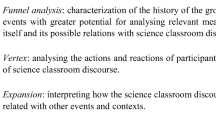Abstract
In this study we capture and analyse in qualitative terms the conversational rhythm—the ebb and the flow of meaning making—in a Year 5 class in order to understand when and how teacher and students succeed in developing shared understandings, and when and how they encounter difficulties. We use the two contrasting concepts of intermingling and bumpiness to catch the phenomenological aspect of time in the science class, which is constituted by the voices of the teacher and the students as they come together to construct disciplinary knowledge. It is a collaborative action research that sheds light on the struggles and possibilities that arise in a science class as a teacher enacts a socio-cultural perspective and engages his students in collecting and analysing experimental data and reasoning through a particular model.
Similar content being viewed by others
References
Arnold, M., & Millar, R. (1996). Learning the scientific “story”: A case study in the teaching and learning of elementary thermodynamics.Science Education, 80(3), 249–281.
Becker, J., & Varelas, M. (1995). Assisting construction: The role of the teacher in assisting the learner's construction of pre-existing cultural knowledge. In L. Steffe (Ed.),Constructivism in education (pp. 433–446). Hillsdale, NJ: Erlbaum.
Dewey, J. (1929).The sources of a science of education. New York: H. Liveright.
Driver, R., Asoko, H., Leach, J., Mortimer, E., & Scott P. (1994). Constructing scientific knowledge in the classroom.Educational Researcher, 23(7), 5–12.
Duschl, R. A. (1990).Restructuring science education: The importance of theories and their development. New York: Teachers College.
Edwards, A. D., & Mercer, N. (1987).Common knowledge: The development of understanding in the classroom. London: Methuen.
Erickson, F. (1996). Going for the zone: The social and cognitive ecology of teacher-student interaction in classroom conversations. In D. Hicks (Ed.),Discourse, learning and schooling (pp. 29–62). New York: Cambridge University.
Gee, J. P. (1991). What is literacy? In C. Mitchell, & K. Weiler (Eds.),Rewriting literacy: Culture and the discourse of the other (pp. 3–12). New York: Bergin and Garvey.
Hicks, D. (1996). Discourse, learning, and teaching.Review of Research in Education, 21, 49–95.
Holton, G. (1988).Thematic origins of scientific thought: Kepler to Einstein. Cambridge, MA: Harvard University.
Kahle, J. B. (1995). Opportunities and obstacles: Science education in the schools. In C. S. Davis, A. B. Ginorio, C. S. Hollenshead, B. B. Lazarus, & P. M. Rayman (Eds.),The equity equation: Fostering the advancement of women in the sciences, mathematics, and engineering (pp. 57–95). San Francisco: Jossey-Bass.
Lemke, J. L. (1990).Talking science: Language, learning, and values. Norwood, NJ: Ablex.
Lincoln, Y., & Guba, E. (1985).Naturalistic inquiry. Beverly Hills, CA: Sage.
Lythcott, J. (1991). The nature of essential knowledge basis for science teachers.Teaching Education, 3(2), 41–55.
O'Loughlin, M. (1992). Rethinking science education: Beyond Piagetian constructivism-Toward a sociocultural model of teaching and learning.Journal of Research in Science Teaching, 29(8), 791–820.
Schauble, L. (1996). The development of scientific reasoning in knowledge-rich contexts.Developmental Psychology, 32(1), 102–119.
Schwab, J. (1978). The practical: A language for curriculum. In I. Westbury, & N. J. Wilkof (Eds.),Science, curriculum, and liberal education: Selected essays (pp. 287–321). Chicago: University of Chicago.
Varelas, M. (1996). Between theory and data in a 7th grade science class.Journal of Research in Science Teaching, 33(3), 229–263.
Varelas, M. (1997). Third and fourth graders' conceptions of repeated trials and best representatives in science experiments.Journal of Research in Science Teaching, 34(9), 853–872.
Varelas, M., & Becker, J. (1997). Internalization of cultural forms of behavior: Semiotic aspects of intellectual development. In B. D. Cox, & C. Lightfoot (Eds.),Sociogenetic perspectives on internalization (pp. 203–219). Hillsdale, NJ: Erlbaum.
Vygotsky, L. S. (1978).Mind in society. Cambridge, MA: Harvard University.
Vygotsky, L. S. (1987). Thinking and Speech. In R. W. Rieber, & A. S. Carton (Eds.),The collected works of L. S. Vygotsky (Vol. 1): Problems of general psychology (N. Minick, Trans.). New York: Plenum Press. (Original work published 1934)
Yackel, E. (1995). Children's talk in inquiry mathematics classrooms. In P. Cobb, & H. Bauersfeld (Eds.),The emergence of mathematical meaning: Interaction in classroom cultures (pp. 131–162). Hillsdale, NJ: Erlbaum.
Author information
Authors and Affiliations
Corresponding author
Rights and permissions
About this article
Cite this article
Varelas, M., Pineda, E. Intermingling and bumpiness: Exploring meaning making in the discourse of a science classroom. Research in Science Education 29, 25–49 (1999). https://doi.org/10.1007/BF02461179
Issue Date:
DOI: https://doi.org/10.1007/BF02461179




